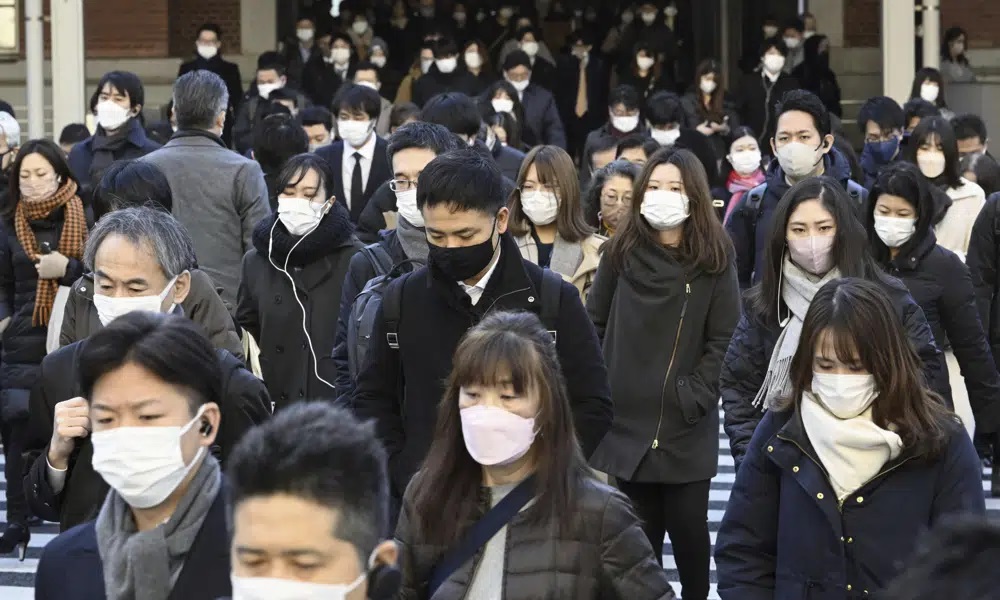COVID-19
Japan to lower COVID-19 to flu status, further easing rules

Japanese Prime Minister Fumio Kishida on Friday announced plans to downgrade the legal status of COVID-19 to the equivalent of seasonal influenza in the spring, a move that would further relax mask wearing and other preventive measures as the country seeks to return to normalcy.
Kishida said he has instructed experts and government officials to discuss the details on lowering COVID-19′s status. A change would also remove self-isolation rules and other anti-virus requirements and allow COVID-19 patients to seek treatment at any hospital instead of only specialized facilities, AP reported.
“In order to return to our ordinary daily life in Japan while pursuing measures to adapt to living with the coronavirus, we will study concrete measures to gradually move on to a next step,” Kishida said.
In Japan, COVID-19 is currently categorized as a Class 2 disease, along with SARS and tuberculosis, and is subject to restricting movements of patients and their close contacts, while allowing central and local governments to issue emergency measures. Downgrading it to Class 5 would mean scrapping those rules.
The planned change would mark a major turning point in Japan’s COVID-19 policy toward normalizing social and economic activities.
The move, however, comes as Japan faces widespread infections and record levels of deaths in what is considered its eighth wave of outbreak since the pandemic began three years ago.
According to the Health Ministry, daily deaths totaled a record high of 503 last Saturday. Experts say the latest increase could be linked to worsening chronic illnesses among older patients.
Downgrading the legal status of COVID-19 under the infectious disease law could remove ongoing hospitalization and self-isolation rules and help to free up hospital beds reserved for COVID-19 patients, Health Minister Katsunobu Kato told reporters.
The idea is to create a system where COVID-19 can be treated as part of ordinary medical services, he said. But he cautioned: “Changing its classification doesn’t mean coronavirus is gone. We still need everyone to take voluntary measures by using masks and precautions.”
Kato said mask wearing is unnecessary outdoors now and that indoor use would also be eased once the downgrade is in place.
Kato said it will require some adjustments for people, workplaces, municipalities and hospitals, and declined to set an exact timeline, other than to say it would occur in “the spring.”
Details are still being worked out but the cost of COVID-19 treatments and vaccinations are expected to still be covered by the government for now.
Japan last fall stopped requiring COVID-19 tests for entrants who had at least three shots — part of the country’s careful easing of measures after virtually closing its borders to foreign tourists for about two years.
Japan is now reporting known daily cases of between 100,000 and 200,000.
COVID-19
WHO declares end to COVID global health emergency

The World Health Organization said Friday that COVID-19 no longer qualifies as a global emergency, marking a symbolic end to the devastating coronavirus pandemic that triggered once-unthinkable lockdowns, upended economies and killed millions of people worldwide.
The announcement, made more than three years after WHO declared the coronavirus an international crisis, offers some relief, if not an ending, to a pandemic that stirred fear and suspicion, hand-wringing and finger-pointing across the globe, AP reported.
The U.N. health agency’s officials said that even though the emergency phase was over, the pandemic hasn’t finished, noting recent spikes in cases in Southeast Asia and the Middle East.
WHO says thousands of people are still dying from the virus every week, and millions of others are suffering from debilitating, long-term effects.
“It’s with great hope that I declare COVID-19 over as a global health emergency,” WHO Director-General Tedros Adhanom Ghebreyesus said.
“That does not mean COVID-19 is over as a global health threat,” he said, warning that new variants could yet emerge. Tedros noted that while the official COVID-19 death toll was 7 million, the real figure was estimated to be at least 20 million.
Tedros said the pandemic had been on a downward trend for more than a year, acknowledging that most countries have already returned to life before COVID-19.
He bemoaned the damage that COVID-19 had done to the global community, saying the pandemic had shattered businesses, exacerbated political divisions, led to the spread of misinformation and plunged millions into poverty.
When the U.N. health agency first declared the coronavirus to be an international crisis on Jan. 30, 2020, it hadn’t yet been named COVID-19 and there were no major outbreaks beyond China.
More than three years later, the virus has caused an estimated 764 million cases globally and about 5 billion people have received at least one dose of vaccine.
In the U.S., the public health emergency declaration made regarding COVID-19 is set to expire on May 11, when wide-ranging measures to support the pandemic response, including vaccine mandates, will end. Many other countries, including Germany, France and Britain, dropped most of their provisions against the pandemic last year.
When Tedros declared COVID-19 to be an emergency in 2020, he said his greatest fear was the virus’ potential to spread in countries with weak health systems.
Most recently, WHO has struggled to investigate the origins of the coronavirus, a challenging scientific endeavor that has also become politically fraught.
COVID-19
COVID-19 in Iran: Nearly 900 new cases, 24 deaths recorded

The Iranian health ministry announced on Sunday that more than 890 new cases of COVID-19 have been identified across the country during the past 24 hours, adding that 24 patients have died in the same period of time, Fars News Agency reported.
"A sum of 891 new patients infected with COVID-19 have been identified in the country based on confirmed diagnosis criteria during the past 24 hours," the Iranian Health Ministry's Public Relations Center said on Sunday, adding, "454 patients have been hospitalized during the same time span."
The ministry’s public relations center said 611 people infected with COVID-19 are in critical condition.
COVID-19
China says 200 million treated, pandemic ‘decisively’ beaten

China says more than 200 million of its citizens have been diagnosed and treated for COVID-19 since it lifted strict containment measures beginning in November.
With 800,000 of the most critically ill patients having recovered, China has “decisively beaten” the pandemic, according to notes from a meeting of the ruling Communist Party’s all-powerful Politburo Standing Committee presided over by President and party leader Xi Jinping, AP reported.
China enforced some of the world’s most draconian lockdowns, quarantines and travel restrictions and still faces questions about the origins of the virus that was first detected in the central Chinese city of Wuhan in late 2019. Heavy-handed enforcement prompted rare anti-government protests and took a heavy toll on the world’s second-largest economy.
The official Xinhua News Agency quoted Xi as saying that policies to control the outbreak had been “entirely correct.” The abrupt lifting in November and December of the “zero COVID” policy that had sought to eliminate all cases of the virus led to a surge in infections that temporarily overwhelmed hospitals.
Case numbers have since peaked and life has largely returned to normal, although international travel in and out of China has yet to return to pre-pandemic levels.
China is now transitioning to a post-pandemic stage after a fight against the outbreak that was “extraordinary in the extreme,” Xinhua said.
The government will continue to “optimize and adjust prevention and control policies and measures according to the times and situations with a strong historical responsibility and strong strategic determination,” Xinhua said.
-

 Regional5 days ago
Regional5 days agoBomb kills chief of Russian nuclear protection forces in Moscow
-

 Sport5 days ago
Sport5 days agoATN once again seals deal to broadcast upcoming IPL across Afghanistan
-

 Sport5 days ago
Sport5 days agoLanka T10: All three matches abandoned due to rain
-

 Latest News5 days ago
Latest News5 days agoIndia hoping to import coal and marble from Afghanistan
-

 Sport4 days ago
Sport4 days agoZimbabwe’s opening ODI against Afghanistan abandoned
-

 Latest News5 days ago
Latest News5 days agoFuel prices rise in Herat as winter approaches
-

 Latest News5 days ago
Latest News5 days agoJapan announces $27.5 million aid package to Afghanistan
-

 Latest News3 days ago
Latest News3 days agoTwo horror accidents on Kabul-Kandahar highway leave 52 dead






















